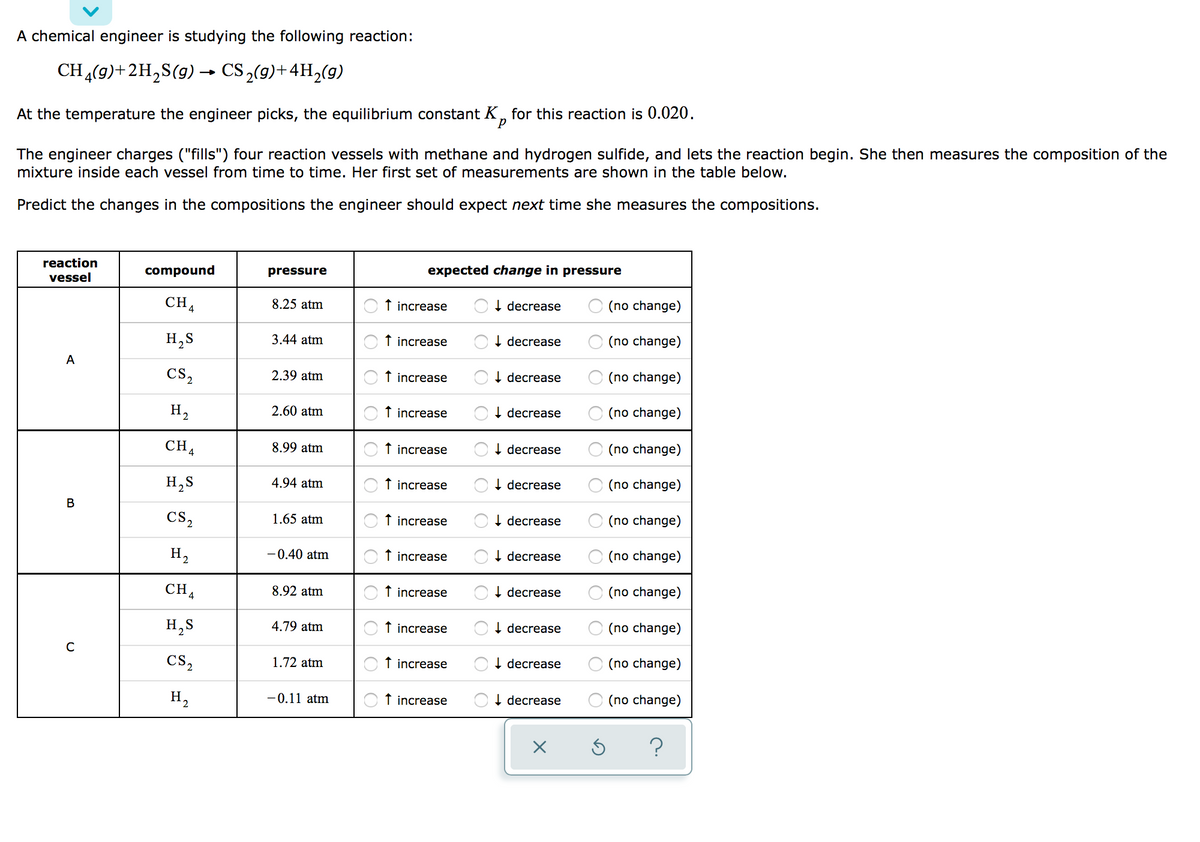A chemical engineer is studying the following reaction: CH 4(9)+2H,S(g) → CS2(9)+4H,(9) At the temperature the engineer picks, the equilibrium constant K, for this reaction is 0.020. The engineer charges ("fills") four reaction vessels with methane and hydrogen sulfide, and lets the reaction begin. She then measures the composition of th mixture inside each vessel from time to time. Her first set of measurements are shown in the table below. Predict the changes in the compositions the engineer should expect next time she measures the compositions. reaction vessel compound pressure expected change in pressure CH4 8.25 atm t increase I decrease (no change) H,S 3.44 atm t increase OI decrease (no change) Cs, 2.39 atm t increase I decrease (no change) 2.60 atm t increase I decrease O (no change) CH 8.99 atm t increase I decrease (no change)
A chemical engineer is studying the following reaction: CH 4(9)+2H,S(g) → CS2(9)+4H,(9) At the temperature the engineer picks, the equilibrium constant K, for this reaction is 0.020. The engineer charges ("fills") four reaction vessels with methane and hydrogen sulfide, and lets the reaction begin. She then measures the composition of th mixture inside each vessel from time to time. Her first set of measurements are shown in the table below. Predict the changes in the compositions the engineer should expect next time she measures the compositions. reaction vessel compound pressure expected change in pressure CH4 8.25 atm t increase I decrease (no change) H,S 3.44 atm t increase OI decrease (no change) Cs, 2.39 atm t increase I decrease (no change) 2.60 atm t increase I decrease O (no change) CH 8.99 atm t increase I decrease (no change)
Introduction to Chemical Engineering Thermodynamics
8th Edition
ISBN:9781259696527
Author:J.M. Smith Termodinamica en ingenieria quimica, Hendrick C Van Ness, Michael Abbott, Mark Swihart
Publisher:J.M. Smith Termodinamica en ingenieria quimica, Hendrick C Van Ness, Michael Abbott, Mark Swihart
Chapter1: Introduction
Section: Chapter Questions
Problem 1.1P
Related questions
Question

Transcribed Image Text:A chemical engineer is studying the following reaction:
CH 4(9)+2H,S(g) -
CS 2(9)+4H2(g)
→
At the temperature the engineer picks, the equilibrium constant K, for this reaction is 0.020.
The engineer charges ("fills") four reaction vessels with methane and hydrogen sulfide, and lets the reaction begin. She then measures the composition of the
mixture inside each vessel from time to time. Her first set of measurements are shown in the table below.
Predict the changes in the compositions the engineer should expect next time she measures the compositions.
reaction
expected change in pressure
compound
pressure
vessel
CHA
8.25 atm
f increase
I decrease
(no change)
H,S
3.44 atm
f increase
I decrease
(no change)
A
Cs,
f increase
I decrease
(no change)
2.39 atm
H2
2.60 atm
f increase
I decrease
(no change)
CHA
f increase
I decrease
(no change)
8.99 atm
H,S
4.94 atm
f increase
I decrease
(no change)
Cs,
I decrease
(no change)
1.65 atm
f increase
H,
-0.40 atm
f increase
I decrease
(no change)
CH4
8.92 atm
f increase
I decrease
(no change)
H,S
4.79 atm
f increase
I decrease
(no change)
Cs,
1.72 atm
↑ increase
I decrease
(no change)
H2
-0.11 atm
↑ increase
I decrease
(no change)
B.
Expert Solution
This question has been solved!
Explore an expertly crafted, step-by-step solution for a thorough understanding of key concepts.
This is a popular solution!
Trending now
This is a popular solution!
Step by step
Solved in 2 steps

Knowledge Booster
Learn more about
Need a deep-dive on the concept behind this application? Look no further. Learn more about this topic, chemical-engineering and related others by exploring similar questions and additional content below.Recommended textbooks for you

Introduction to Chemical Engineering Thermodynami…
Chemical Engineering
ISBN:
9781259696527
Author:
J.M. Smith Termodinamica en ingenieria quimica, Hendrick C Van Ness, Michael Abbott, Mark Swihart
Publisher:
McGraw-Hill Education

Elementary Principles of Chemical Processes, Bind…
Chemical Engineering
ISBN:
9781118431221
Author:
Richard M. Felder, Ronald W. Rousseau, Lisa G. Bullard
Publisher:
WILEY

Elements of Chemical Reaction Engineering (5th Ed…
Chemical Engineering
ISBN:
9780133887518
Author:
H. Scott Fogler
Publisher:
Prentice Hall

Introduction to Chemical Engineering Thermodynami…
Chemical Engineering
ISBN:
9781259696527
Author:
J.M. Smith Termodinamica en ingenieria quimica, Hendrick C Van Ness, Michael Abbott, Mark Swihart
Publisher:
McGraw-Hill Education

Elementary Principles of Chemical Processes, Bind…
Chemical Engineering
ISBN:
9781118431221
Author:
Richard M. Felder, Ronald W. Rousseau, Lisa G. Bullard
Publisher:
WILEY

Elements of Chemical Reaction Engineering (5th Ed…
Chemical Engineering
ISBN:
9780133887518
Author:
H. Scott Fogler
Publisher:
Prentice Hall


Industrial Plastics: Theory and Applications
Chemical Engineering
ISBN:
9781285061238
Author:
Lokensgard, Erik
Publisher:
Delmar Cengage Learning

Unit Operations of Chemical Engineering
Chemical Engineering
ISBN:
9780072848236
Author:
Warren McCabe, Julian C. Smith, Peter Harriott
Publisher:
McGraw-Hill Companies, The